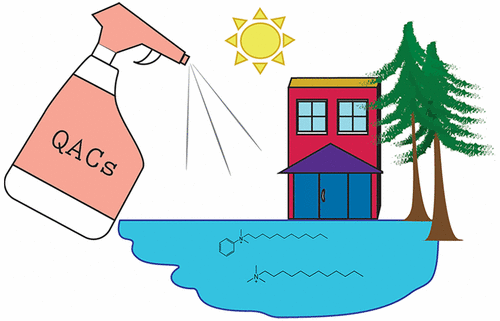当前位置:
X-MOL 学术
›
Environ. Sci. Technol. Lett.
›
论文详情
Our official English website, www.x-mol.net, welcomes your
feedback! (Note: you will need to create a separate account there.)
Increased Use of Quaternary Ammonium Compounds during the SARS-CoV-2 Pandemic and Beyond: Consideration of Environmental Implications
Environmental Science & Technology Letters ( IF 8.9 ) Pub Date : 2020-06-26 , DOI: 10.1021/acs.estlett.0c00437 Priya I Hora 1 , Sarah G Pati 2 , Patrick J McNamara 3 , William A Arnold 1
Environmental Science & Technology Letters ( IF 8.9 ) Pub Date : 2020-06-26 , DOI: 10.1021/acs.estlett.0c00437 Priya I Hora 1 , Sarah G Pati 2 , Patrick J McNamara 3 , William A Arnold 1
Affiliation

|
Quaternary ammonium compounds (QACs) are active ingredients in over 200 disinfectants currently recommended by the U.S. EPA for use to inactivate the SARS-CoV-2 (COVID-19) virus. The amounts of these compounds used in household, workplace, and industry settings has very likely increased, and usage will continue to be elevated given the scope of the pandemic. QACs have been previously detected in wastewater, surface waters, and sediments, and effects on antibiotic resistance have been explored. Thus, it is important to assess potential environmental and engineering impacts of elevated QAC usage, which may include disruption of wastewater treatment unit operations, proliferation of antibiotic resistance, formation of nitrosamine disinfection byproducts, and impacts on biota in surface waters. The threat caused by COVID-19 is clear, and a reasonable response is elevated use of QACs to mitigate spread of infection. Exploration of potential effects, environmental fate, and technologies to minimize environmental releases of QACs, however, is warranted.
中文翻译:

SARS-CoV-2 大流行期间及之后季铵化合物的使用增加:考虑环境影响
季铵化合物 (QAC) 是美国 EPA 目前推荐用于灭活 SARS-CoV-2 (COVID-19) 病毒的 200 多种消毒剂中的活性成分。这些化合物在家庭、工作场所和工业环境中的使用量很可能有所增加,并且鉴于大流行的范围,使用量将继续增加。此前已在废水、地表水和沉积物中检测到 QAC,并探讨了其对抗生素耐药性的影响。因此,评估 QAC 使用量增加的潜在环境和工程影响非常重要,其中可能包括废水处理装置运行的中断、抗生素耐药性的扩散、亚硝胺消毒副产物的形成以及对地表水中生物群的影响。COVID-19 造成的威胁是显而易见的,合理的应对措施是增加使用 QAC 来减轻感染的传播。然而,有必要探索潜在影响、环境命运以及尽量减少 QAC 向环境释放的技术。
更新日期:2020-06-26
中文翻译:

SARS-CoV-2 大流行期间及之后季铵化合物的使用增加:考虑环境影响
季铵化合物 (QAC) 是美国 EPA 目前推荐用于灭活 SARS-CoV-2 (COVID-19) 病毒的 200 多种消毒剂中的活性成分。这些化合物在家庭、工作场所和工业环境中的使用量很可能有所增加,并且鉴于大流行的范围,使用量将继续增加。此前已在废水、地表水和沉积物中检测到 QAC,并探讨了其对抗生素耐药性的影响。因此,评估 QAC 使用量增加的潜在环境和工程影响非常重要,其中可能包括废水处理装置运行的中断、抗生素耐药性的扩散、亚硝胺消毒副产物的形成以及对地表水中生物群的影响。COVID-19 造成的威胁是显而易见的,合理的应对措施是增加使用 QAC 来减轻感染的传播。然而,有必要探索潜在影响、环境命运以及尽量减少 QAC 向环境释放的技术。











































 京公网安备 11010802027423号
京公网安备 11010802027423号